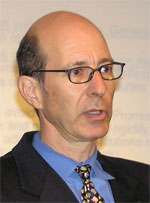This essay argues that some forty years ago the Republican Party struck a Faustian bargain whereby it traded integrity and decency for tax cuts and a corporate dominated economy. Now, the Republican party is reaping the consequences of that bargain in the form of its capture by Donald Trump and his followers. However, it also […]
Read More »Life among the Econ: fifty years on
Almost fifty years ago, the Swedish econographer Axel Leijonhufvud (1973) wrote a seminal study on the Econ tribe titled “Life among the Econ”. This study revisits the Econ and reports on their current state. Life has gotten more complicated since those bygone days. The cult of math modl-ing has spread far and wide, so that […]
Read More »2021 Godley-Tobin Lecture: Marc Lavoie, “Godley versus Tobin on Monetary Matters”
REGISTER HERE.
Read More »Rethinking capacity utilization choice: the role of surrogate inventory and entry deterrence
This paper presents a macroeconomics-friendly Post Keynesian model of the firm describing both an inventory theoretic approach and an entry deterrence approach to choice of excess capacity. The model explains why firms may rationally choose to have excess capacity. It also shows the two approaches are complementary and reinforcing of each other. Analytically, the paper […]
Read More »Sliding Doors: The Day US Democracy Almost Died
Sunday January 10, 2021. It is now four days since the January 6 mob attack on the US Congress which President Donald Trump incited. In a manner akin to a combat situation, the numbness induced by the overwhelming nature of the event is giving way to shock and anger. What is also becoming clear is […]
Read More »National Policy Space: Reframing the Political Economy of Globalization and its Implications for National Sovereignty and Democracy
This paper critiques the trilemma framing of the political economy of globalization, and offers an alternative framing rooted in the construct of national policy space. Globalization causes changes in policy space which have drop-down implications for national sovereignty and democratic politics. Globalization involves choices regarding the “degree”, “type”, and “dimensions” of international economic integration. Contrary […]
Read More »Diego Maradona (1960-2020): Some Bittersweet Reflections
Maradona was more than just an extraordinary footballer. He was also a complicated social icon. That further distinguishes him from other footballers, though Pele also has some of that… and it is great to see young footballers like Marcus Rashford taking up that mantle. He was both rewarded by and terribly exploited by the system. […]
Read More »Another Thomas Palley Critique Of Neochartalism — Ramanan
Another Thomas Palley Critique Of Neochartalism — Ramanan For the record. My view on this is that it fails to correctly present the MMT position (again). MMT is a macroeconomic theory based on institutional analysis rather than being either an axiomatic system like conventional economics or a socio-economic and political analysis like Marxian economics. That is to say, MMT is framed in terms of the existing world system. It is an alternative to "neoliberalism," in so...
Read More »What’s wrong with modern money theory (MMT): macro and political economic restraints on deficit financed fiscal policy
The essential claim of MMT is sovereign currency issuing governments, with flexible exchange rates and without foreign currency debt, are financially unconstrained. This paper analyzes the macroeconomic arguments behind that claim and shows they are suspect. MMT underestimates the economic costs and exaggerate the capabilities of deficit financed fiscal policy. Those analytic shortcomings render it […]
Read More » Thomas Palley: Economics for Democratic and Open Societies
Thomas Palley: Economics for Democratic and Open Societies


